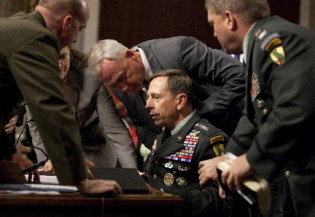It may seem hard to believe at this point, but it wasn’t so many years ago that Gen. David Petraeus was in very much the same position as Gen. Stanley McChrystal found himself in. The public face of President Bush’s failing war in Iraq, Petraeus’ popularity was plummeting, and his future was very much in doubt.
 By a stroke of good luck, Gen. Petraeus found himself credited with “winning” the war in Iraq not through anything he did, but rather because his disastrous tenure was so bloody and had driven so many Iraqis from their homes that the secularly split neighborhoods had all but been emptied out and, predictably, violence dropped.
By a stroke of good luck, Gen. Petraeus found himself credited with “winning” the war in Iraq not through anything he did, but rather because his disastrous tenure was so bloody and had driven so many Iraqis from their homes that the secularly split neighborhoods had all but been emptied out and, predictably, violence dropped.
It didn’t end the war, of course, and after a brief lull people started moving back to these neighborhoods, and we are seeing once again that violence is back on the rise in Iraq. The war that Petraeus “won,” at least in the administration’s eyes, is still going on, and going badly.
But this isn’t about the myth of Petraeus’ first victory, an old story, but rather President Obama’s selection of Petraeus as the new face of his own primary war, in Afghanistan, where he is expected to take largely the same strategy that didn’t really work in Iraq, and replicate the drop in violence in Afghanistan.
It is not lost on many people that the war in Afghanistan is a very different war than the one in Iraq, but the reality is that the Obama Administration has been trying to shoe-horn the Iraq strategy onto Afghanistan since the president took office, escalating the war over and over and watching with endless optimism as the conflict continues to get worse.
But having gone from the failing general in Iraq to a modern day savior of the endless warfare state, the myth of the general’s competence has landed him into the most unenviable position possible, the commander of the Afghan War, which is steadily spiraling out of control.
To make matters worse, there is no external savior for Petraeus this time. The violence in Afghanistan isn’t a side effect of the American occupation but something fueled directly by it and aimed directly against it. There is no ethnic or sectarian divide that, through sheer disastrous failure, will quiet down simply for lack of immediate proximity.
In fact the proximity problem has gotten worse over time, as the US adds more troops in the areas with the most insurgents. The escalation plan would also add Afghan forces to these areas, providing another target.
While the results of the Obama Administration’s strategy so far are pretty clear, an ever worsening security situation, the plan remains unchanged, and the hope that Petraeus can turn the situation around with more of the same woefully misguided. The only question is how long the situation can continue to worsen before people start to question why the so-called Petraeus magic isn’t transferring to Afghanistan.


